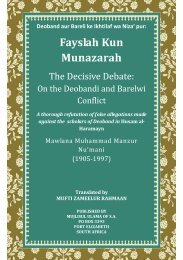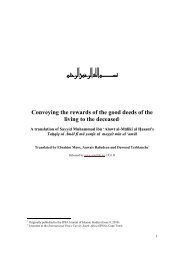al_etidaal_gn
al_etidaal_gn
al_etidaal_gn
Create successful ePaper yourself
Turn your PDF publications into a flip-book with our unique Google optimized e-Paper software.
(S<strong>al</strong>l<strong>al</strong>lahu Alayhi Wasailam) was marching towards the battlefield. A man wellknown<br />
for his skill in battle and courage came <strong>al</strong>ong with the intention of<br />
participating. When the Sahabah (Radi<strong>al</strong>lahu anhum) saw him they were pleased.<br />
Rasulullah (S<strong>al</strong>laflahu Alayhi Was<strong>al</strong>lam) asked him: “Have you embraced the faith?”<br />
He replied: “No”.<br />
Rasulullah (S<strong>al</strong>l<strong>al</strong>lahu Alayhi Was<strong>al</strong>lam) said: “I do not accept help from a<br />
polytheist.”<br />
That happened but it is <strong>al</strong>so reported that later Rasulullah (S<strong>al</strong>l<strong>al</strong>lahu Alayhi<br />
Was<strong>al</strong>lam) sought financi<strong>al</strong> and other help from a polytheist -Safwan bin Urnmayya<br />
in the battles of Khaybar and Hunayn. Now which of these Hadeeth enjoy preference<br />
and why? (Kitabul Eetibaar) What is more, at Badr the Muslims in their weakness<br />
and being few in number were much more in need of help than at the battles of<br />
Khaybar and Hunayn.<br />
Once in the 8th year Hijri Rasulullah (S<strong>al</strong>l<strong>al</strong>lahu Alayhi Was<strong>al</strong>lam) was going<br />
somewhere when one of the Sahabah (Radi<strong>al</strong>lahU anhum) while fasting, was being<br />
cupped (to draw blood). Rasulullah (S<strong>al</strong>l<strong>al</strong>lahu Alayhi Was<strong>al</strong>lam) said: “The fast of<br />
him who cups and him who is being cupped is nullified.” But during the 10th year of<br />
the Hijri Rasulullah (S<strong>al</strong>l<strong>al</strong>lahu Alayhi Was<strong>al</strong>lam) had himself cupped while fasting.”<br />
Then there is <strong>al</strong>so a saying of his that the payment received for cupping is unholy, but<br />
at the same time we <strong>al</strong>so have it on record that Rasulullah (S<strong>al</strong>l<strong>al</strong>lahu Alayhi<br />
Was<strong>al</strong>lam) himself paid the man who cupped him. How is the one Hadeeth given<br />
preference over another?<br />
There is a Hadeeth of Rasulullah (S<strong>al</strong>l<strong>al</strong>lahu Alayhi Was<strong>al</strong>lam) which says that<br />
nothing (on the outside) cuts off prayer. But then there is another which says that if a<br />
woman, or an ass or a dog crossed in front of a person in S<strong>al</strong>aah, the S<strong>al</strong>aat breaks.<br />
How are these statements reconciled?<br />
Similarly there is a Hadeeth to the effect that should S<strong>al</strong>aah time come upon you and<br />
food he ready to be eaten, the me<strong>al</strong> should be taken first. But then there is another<br />
Hadeeth which says that S<strong>al</strong>aah should not be postponed for the sake of me<strong>al</strong>s or<br />
anything else. What should be the correct line of action in this regard?<br />
In brief there are numerous ordinances of Shariat, where for various reasons different<br />
commands were given. Hence one cannot be merely looking at the translation of the<br />
Quran or at any translation of some Hadeeth book or by having obtained a degree in<br />
Arabic, discover the reasons for those different ordinances. Those things are not<br />
enough to be able to ascertain to which Hadeeth preference should be given, or which<br />
preceeded which, or which of the various ordinances is the fundament<strong>al</strong> standing<br />
order and which was a temporary order through some speci<strong>al</strong> circumstances.<br />
Rasulullah (S<strong>al</strong>l<strong>al</strong>lahu Alayhi Was<strong>al</strong>lam) said: “Three persons are a c<strong>al</strong>amity for<br />
deen. An immort<strong>al</strong> jurist, (faqeeh) an unjust king (tyrant king) and and i<strong>gn</strong>orant<br />
Al- Eti’da<strong>al</strong> Fi Maraatibur- Rija<strong>al</strong> 171




